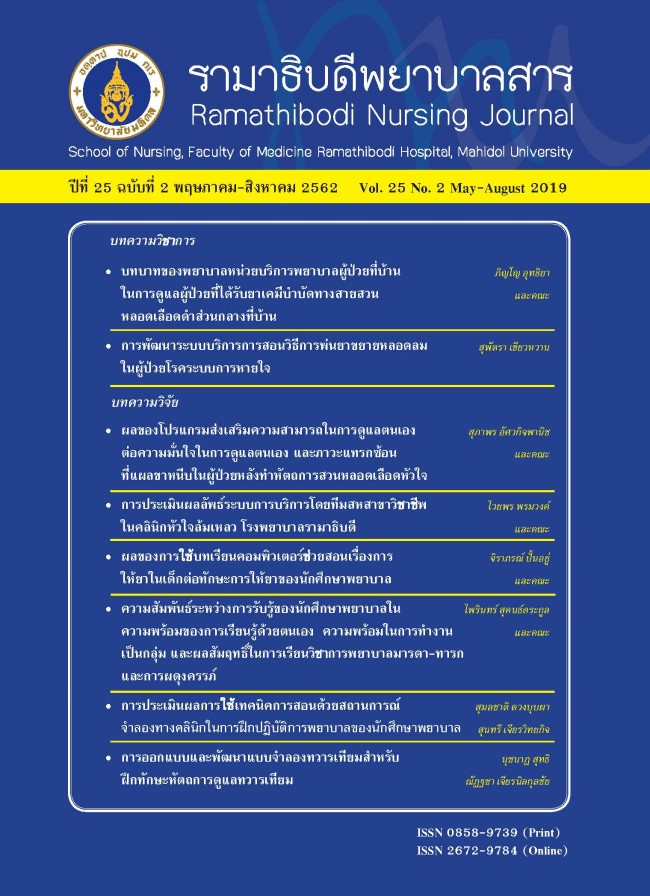The Effects of Self Care Agency Promoting Program on Self-Care Confidence and Groin Wound Complications in Patients post Cardiac Catheterization
Main Article Content
Abstract
The aims of this one group pre-posttest quasi-experimental study were to: examine the effect of self- care agency promoting program on self-care confidence; and, study wound healing among patients after cardiac catheterization. Orem’s Self-Care theory combined with the knowledge of caring for patient after cardiac catheterization were used as the conceptual framework of this study. A total of 245 patients after cardiac catheterization admitted to Ramathibodi hospital was recruited by purposive sampling. The program consisted of 3 phases with in the 24 hours period of hospital admissions. The program included 1) Phase I: Promoting knowledge and understanding of self-care by assessing self-care needs and problems, providing self-care education, 2) Phase II: Developing self-care skills by training wound care and medication administration skills, and 3) Phase III: Following and supporting self-care continuum by using telephone to follow up after hospital discharge for 3 days and in case of needing advice, providing telephone call for 24 hours. Self-care confidence was measured 3 times at baseline, after finishing program, and 3 days after hospital discharge. Wound healing was measured 2 times, before hospital discharge and 3 days after hospital discharge. Data were analyzed using descriptive statistic, Friedman’s test, and Wilcoxon matched pairs signed-ranks test. The results revealed that the mean scores of self-care confidence at post- test and the 3 days after hospital discharge were significantly higher than the pre-test samples. With respect to wound healing, the results showed that at 3 days after hospital discharge, the wound of six samples healed poorly. Five samples had normal wounds that became ecchymosis wounds. One sample had normal wounds that became bleeding wounds. In conclusion, self-care agency promoting program had a very significant effect on self-care confidence of patients after cardiac catheterization. Therefore, this program should be used as a guideline for pre-discharge education and self-care skill training for patients undergoing cardiac catheterization to promote patients’ self-care agency.
Keywords: Self-care agency, Self-care confidence, Cardiac catheterization
Article Details
บทความ ข้อมูล เนื้อหา รูปภาพ ฯลฯ ที่ได้รับการตีพิมพ์ในรามาธิบดีพยาบาลสาร ถือเป็นลิขสิทธิ์ของวารสาร หากบุคคลหรือหน่วยงานใดต้องการนำทั้งหมดหรือส่วนหนึ่งส่วนใดไปเผยแพร่หรือเพื่อกระทำการใด ใด จะต้องได้รับอนุญาตเป็นลายลักษณ์อักษรจากรามาธิบดีพยาบาลสารก่อนเท่านั้น
References
2018 May 17]. Available from World Health Organization
Website: https://www.who.int/news-room/fact-sheets/
detail/cardiovasculardiseases-cvds
2. Bureau of Non Communicable Disease. World heart day
2018 [cited 2018 July 9]. Available from: https://www.
thaincd.com/2016/media-detail.php?id=13233&
gid=1-015-006. (in Thai)
3. Dencker D, Pedersen F, Engstrøm T, Køber L, Højberg
S, Nielsen MB, et al. Major femoral vascular access
complications after coronary diagnostic and interventional
procedures: a Danish register study. Int J Cardiol. 2016;
202:604-608.
4. Lee KE, Seo YJ, Kim GB, An HS, Song YH, Kwon BS,
et al. Complications of cardiac catheterization in structural
heart disease. Korean Circ J. 2016 Mar;46(2):246-255.
5. Hartford K. Telenursing and patients’recovery from bypass
surgery. J Adv Nurs. 2005;50(5): 459-68.
6. Ghonaem SE, Ali MM, Mosbah SK. Effectiveness of
planned discharge instructions on patients’ recovery
following coronary artery bypass graft surgery. IOSRJNHS.
2018;7(6):8-16.
7. Gau JY, Ting CT, Yeh MC, Chang TH. The effectiveness
of comprehensive care program at improving self-care and
quality of life and reducing rehospitalization in patients
with congestive heart failure. EBN. 2008;4:233e41.
8. Orem DE, Taylor SG, Renpenning KM. Nursing: Concepts
of practice. 6th ed. St. Louis: 2001.
9. Furuya RK, Mata LR, Varas VS, Appoloni AH, Dantas
RA, Silveira RC, et al. Telephone follow-up for patients
after myocardial revascularization: a systematic review.
AJN. 2013 May;113(5):28-39.
10. Cohen J. Statistical power analysis for the behavioral
sciences (2nd ed.). Hillsdale, NJ: Lawrence Erlbaum
Associates; 1988.
11. Faul F, Erdfelder E, Buchner A, Lang A-G. Statistical
power analyses using G*power 3.1: tests for correlation
and regression analyses, Behav Res Methods.
2009;41(4):1149-60.
12. Hørdam B, Sabroe S, Pedersen PU, Mejdahl S, Søballe
K. Nursing intervention by telephone interviews of patients
aged over 65 years after total hip replacement improves
health status: a randomised clinical trial. Scand J Caring
Sci. 2010 Mar;24(1):94-100.
13. Ritklar L. Results of the clinical nursing practice guideline
on complications and anxiety levels in patients with
coronary artery disease who undergoing coronary artery
angiogram at internal medicine ward [cited 2019 March
14]. Available from Thammasat University Hospital
Website: https://www.hospital.tu.ac.th/km/admin/
new/240418_085320.pdf
14. Tongjan P, Namvongprom A, Namvongprom NO.
Anxiety, satisfaction, and complication in patients
receiving nursing practice guideline for coronary
angiography. Journal of Nursing and Health Care.
2015;33(1):34-40.
15. Elshatarat RA, Stotts NA, Engler M, Froelicher ES.
Knowledge and beliefs about smoking and goals for
smoking cessation in hospitalized men with cardiovascular
disease. Heart Lung. 2013;42(2):126-32.
16. Siabani S, Leeder SR, Davidson PM. Barriers and
facilitators to self-care in chronic heart failure: A metasynthesis
of qualitative studies. Springer Plus; 2013 [cited
2013 July 16]. Available from: https://springer plus.
springeropen.com/articles/10.1186/ 2193-1801-2-320
17. Utriyaprasit K, Moore SM, Chaiseri P. Recovery after
coronary artery bypass surgery: effect of an audiotape
information programme. J Adv Nurs. 2010;66:1747-59.
18. Bench SD, Day T, Griffiths P. Involving users in the
development of effective critical care discharge information:
a focus group study. Am J Crit Care. 2011;20:443-52.
19. Fredericks S, Ibrahim S, Puri R. Coronary artery bypass
graft surgery patient education: a systematic review. Prog
Cardiovasc Nurs. 2009;24:162-8.
20. Spyropoulos V, Ampleman S, Miousse C. Cardiac surgery
discharge questionnaires: meeting information needs of patients
and families. Can J Cardiovasc Nurs. 2011;21:13-20.
21. Cené CW, Haymore LB, Dolan-Soto D, et al. Self-care
confidence mediates the relationship between perceived
social support and self-care maintenance in adults with
heart failure. J Card Fail. 2013; 19(3): 202–10.
22. Fivecoat1 HC, Sayers SL, Riegel B. Social support predicts
self-care confidence in patients with heart failure. Eur J
of Cardiovasc Nurs. 2018;7(7):598-604.
23 Cebeci F, Celik SS. Discharge training and counseling
increase self-care ability and reduce post discharge
problems in CABG patients. J Clin Nurs. 2008;17:412-20.
24. Dangas G, Mehran R, Kokolis S. Vascular complications
after percutaneous coronary interventions following
hemostasis with manual compression versus arteriotomy
closure devices. J Am Coll Cardiol. 2001;38(3):638-41.


